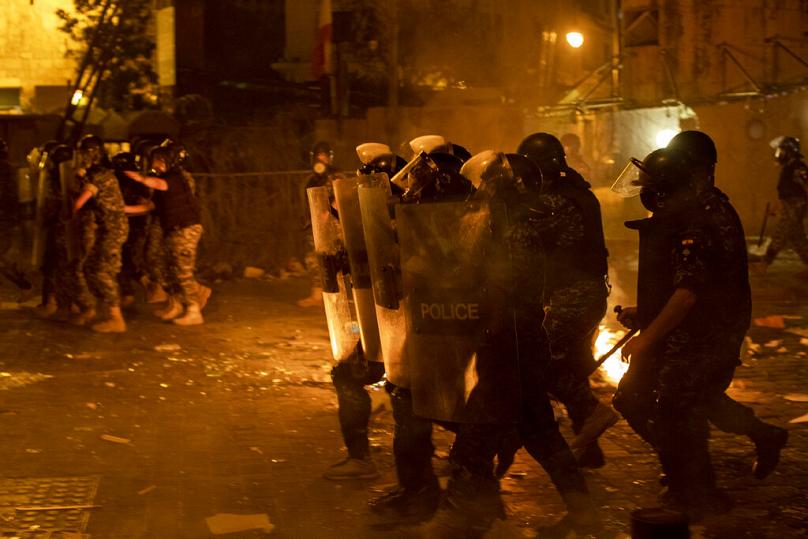Protesters clashed with police on Thursday night at an anti-government rally in the Lebanese capital in the wake of Tuesday’s blast.
Demonstrators pelted officers with stones, voicing their anger against the corrupt and incompetent political elite.
They gathered near the country’s parliament where they lit small fires — authorities responded by firing tear gas to disperse them.

Calls have circulated on social media calling for anti-government demonstrations on Saturday in Beirut, with users employing a hashtag that translates to “hang them”.
Many in the city feel government negligence and corruption are to blame for the deadly explosion that devastated the Lebanese capital on Tuesday.
The investigation into the blast is focusing on the neglected cargo of ammonium nitrate that was left in storage for years at the city’s port.
The leader of the inquiry, military judge Fady Akki, says that 16 port employees have been detained and 18 people have been questioned so far.
They include port and customs officials as well as those in charge of maintenance at the warehouse where the ammonium nitrate was stored.
Shock has turned into anger in Beirut as residents tried to return to their destroyed homes and businesses on Thursday.
People are angry as this explosion has pushed them further into poverty and despair.
Around 300,000 people, more than 12% of Beirut’s population, were unable to return to their homes because of the explosion.
Earlier on Thursday, French President Emmanuel Macron offered his support to the Lebanese people and met with Beirut residents who asked for help.
Some shouted “revolution” and “the people want the end of the regime,” while the president walked along the streets of the Gemmazye district.
Macron said he would put pressure on the Lebanese government for reforms and that he would propose “a new political pact”.
“I will be back on the first of September and if they can’t do it, I will keep my responsibility to you,” he added.
The French leader also promised that aid provided by his country would be distributed fairly and transparently and that it would “not go into the hands of corruption.”
But despite international aid and Macron’s visit, some remain unconvinced about the future of Lebanon.
“What was destroyed in 15 years of war was destroyed again in one second,” said Tony Sawaya, the owner of an insurance broker. He blames the government for the blast.
“Nothing will change. It will be business as usual,” he added. “All corrupt politicians are supported by their followers and the international community.”
The same factions have ruled Lebanon for decades and many in the country accuse them of benefiting from corruption and turning a blind eye to it within the country’s institutions.
For over a decade watchdog groups and Lebanon’s media have reported widespread corruption at the Port of Beirut, including bribery and hiding of merchandise from custom duties or taxes.
Many observers say there is little chance that things will change following the investigation into the blast.
Fawaz Gerges, professor of Middle Eastern politics at the London School of Economics told Associated Press: “Even though historically speaking, such national catastrophes or ruptures serve as a catalyst for transformative change, I am deeply sceptical about the governing and ruling elite in Lebanon instituting change on their own. This is delusional.’
Gerges says the main question now is whether the Lebanese people will collectively rise up and say “enough is enough”.
EURO NEWS

Leave a Reply
You must be logged in to post a comment.